
Abel Ayala-Garcia, 31, of Columbus Ayala-Garcia was booked into Bartholomew County Jail on April 28 and released to an undisclosed federal agency the same day. He faces federal charges of conspiracy to distribute methamphetamine and conspiracy to launder monetary instruments. The conspiracy to distribute methamphetamine charge carries a potential sentence of 10 years to life in prison and a $10 million fine. The conspiracy to launder monetary instruments carries a potential sentence of 0 to 20 years in prison and a $500,000 fine.
INDIANAPOLIS — A federal judge has set a hearing to determine whether two former Columbus residents who are facing federal drug trafficking charges are aware that they have been offered plea agreements.
U.S. District Judge James R. Sweeney II has scheduled a hearing on May 20 for former Columbus residents Abel Ayala-Garcia and Erlin Lucero-Asencio, as well as two other defendants charged in an alleged drug trafficking conspiracy, to determine whether they have been notified by their attorneys of plea agreements that prosecutors have offered them, according to filings in U.S. District Court in Indianapolis.
The two former Columbus residents have been charged with conspiracy to possess and distribute controlled substances and conspiracy to launder monetary instruments. They are both facing 10 years to life in prison if convicted.
The order came after federal prosecutors asked the court to “inquire whether defense counsel has communicated to the defendants captioned above any and all pretrial plea offers made by the United States,” according to court filings.
“Formal plea offers have now been extended by the United States to the defendants captioned above. However, the offers have not been accepted by the defendants,” according to the request. “…When viewed against the backdrop of the high potential penalties applicable in this case, the United States respectfully requests that counsel be permitted to address, on the record, whether any plea discussions were ever had between counsel and the defendant, and affirm that any formal plea offers were rejected by the defendant.”
In their request, federal prosecutors cited the 2012 U.S. Supreme Court case Missouri v. Frye in which the high court held that convictions can be overturned if defense attorneys do not communicate or adequately assist their clients in deciding whether to accept a plea agreement.
Nearly 98% of convictions nationwide came from guilty pleas, according to a report released last year by the Plea Bargain Task Force, which was created by the American Bar Association Criminal Justice Section.
Indianapolis attorney Doneaka Rucker-Brooks is listed as Ayala-Garcia’s attorney, according to court records.
However, Ayala-Garcia has sent documents to the court on his own behalf even though he has had an attorney, according to court records. In both instances, the judge ordered the documents to be delivered to his attorney without being read.
In August, Lucero-Asencio filed a petition to plead guilty to possess with intent to distribute controlled substances, including 500 grams of or more of methamphetamine. However, he withdrew his petition in November and asked for a new attorney.
His new attorney, Julie Chambers of the Chamber Law office LLC in Indianapolis, who was appointed to represent him on Dec. 7, asked the judge to push back his March 25 trial date to allow her more time to consult with her client on the pending charges and review discovery.
On Jan. 29, the judge agreed to push back the trial date to Aug. 26 for several defendants, including Lucero-Asencio and Ayala-Garcia. However, there had been no public updates since then.
Federal authorities allege that Ayala-Garcia, Lucero-Asencio and more than a dozen other individuals were part of a drug trafficking network with ties to a Mexican drug cartel once run by notorious leader Joaquin “El Chapo” Guzman that used a number of couriers and mailing companies to transport methamphetamine and other substances from the U.S.-Mexico border to Indianapolis.
From there, the drugs would be handed off to other individuals to distribute in other areas of central and southern Indiana, including Bartholomew and Jackson counties, according to court filings.
Other local residents who were arrested as part of the alleged conspiracy include Claudio Garcia-Morales of Columbus, Allison Perdue of Seymour and Victor Vazquez-Hernandez of Seymour.
Vazquez-Hernandez was recently sentenced to 10 years, seven months in prison after pleading guilty to one count of possession with intent to distribute 50 grams or more of methamphetamine.
Garcia-Morales also was recently sentenced to three years and 10 months in federal prison after pleading guilty to conspiracy to possess with intent to distribute controlled substances, including 500 grams or more of methamphetamine.
Perdue is scheduled to be sentenced this month.
Lucero-Asencio previously resided in Columbus and has a criminal history in Bartholomew County, according to local court records.
He was arrested in Columbus in 2013 after allegedly selling $5,300 in methamphetamine to a confidential informant on two occasions in the parking lot of the Kroger Marketplace on North National Road, according to a probable cause affidavit.
He also was arrested in Columbus in 2015 for possession of a cocaine after allegedly offering the drug to an individual in the bathroom of the El Corral Night Club on State Street.
Drug Enforcement Administration officials told The Republic in 2022 that the members of the drug trafficking ring were some of the biggest suppliers of drugs in Bartholomew and Jackson counties — including methamphetamine and fentanyl — and had ties to the Sinaloa Cartel, which experts say controls a wholesale distribution network in the U.S. and elsewhere to get drugs into the hands of local street dealers.
The charges stem from an investigation launched by the DEA in 2021, court records state. Over the course of the investigation, federal agents received authorization to intercept and monitor communications on nine cellphones, including two phones belonging to Lucero-Asencio.
DEA agents said the suspects would routinely communicate and discuss obtaining and distributing methamphetamine over the intercepted phones.
Additionally, federal authorities said several of the individuals involved in the drug trafficking network attempted to disguise financial transactions to conceal that the money came from distributing controlled substances.
Court filings state that the conspirators sent at least 324 wire transfers totaling $291,116 from Indiana to Phoenix, Arizona, and Mexico from Jan. 5, 2020, to April 26, 2022 — including a wire transfer made directly from Columbus to a municipality in Sinaloa, Mexico. Sinaloa is a state along the Pacific Ocean in northwestern Mexico.




